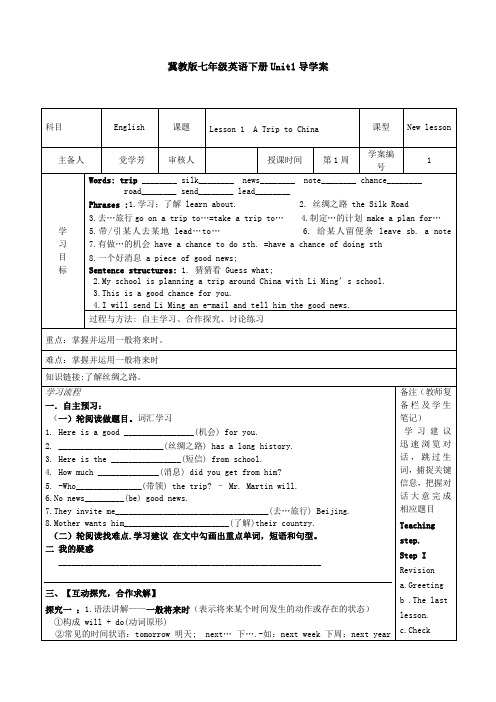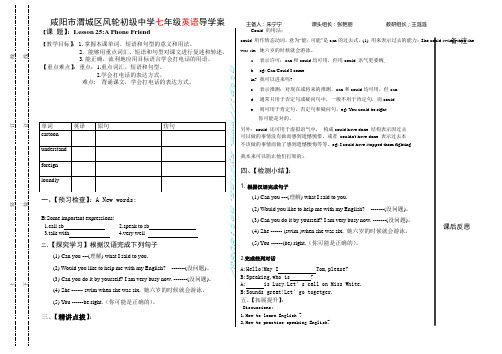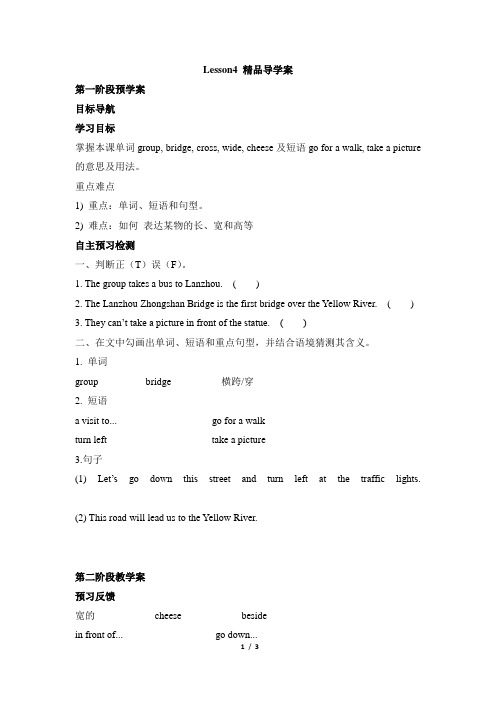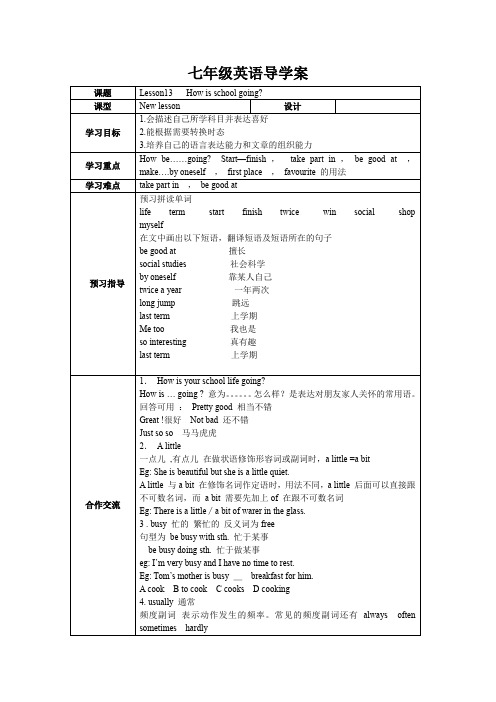冀教版七年级英语下册导学案(2020年整理).pptx
- 格式:pptx
- 大小:66.92 KB
- 文档页数:14

冀教版七年级英语下册Unit1导学案科目English 课题Lesson 1 A Trip to China 课型New lesson主备人党学芳审核人授课时间第1周学案编号1学习目标Words: trip ________ silk________ news________ note________ chance________road________ send________ lead________Phrases :1.学习;了解 learn about. 2. 丝绸之路 the Silk Road3.去…旅行go on a trip to…=take a trip to…4.制定…的计划 make a plan for…5.带/引某人去某地lead…to…6. 给某人留便条 leave sb. a note7.有做…的机会 have a chance to do sth. =have a chance of doing sth8.一个好消息 a piece of good news;Sentence structures: 1. 猜猜看 Guess what;2.My school is planning a trip around China with Li Ming’s school.3.This is a good chance for you.4.I will send Li Ming an e-mail and tell him the good news.过程与方法: 自主学习、合作探究、讨论练习重点:掌握并运用一般将来时。
难点:掌握并运用一般将来时知识链接:了解丝绸之路。
学习流程一.自主预习:(一)轮阅读做题目。
词汇学习1. Here is a good ________________(机会) for you.2. ________________________(丝绸之路) has a long history.3. Here is the ________________(短信) from school.4. How much ______________(消息) did you get from him?5. -Who_______________(带领) the trip? – Mr. Martin will.6.No news_________(be) good news.7.They invite me___________________________________(去…旅行) Beijing.8.Mother wants him________________________(了解)their country.(二)轮阅读找难点.学习建议在文中勾画出重点单词,短语和句型。


玉门三中 七年级英语(下)导学案 主备人 李蔼芸 审核人 编号 NO.17 学生姓名: 班级: 等级 时间把规范修炼成一种习惯,把认真内化成一种性格课题lesson 17 A taxi to the Hotel【学习目标】1. Newwords: driver , translate surprised ,hey, drive ,quickly, another, slowly, 2 .Key sentences: (1) Let‟s take a taxi.(2) Don‟t translate for me. Please don‟t drive so quickly.(3) There are so many bicycles, cars and buses here. There is a bicycle! (4) The cars are quick. They go quickly. The bicycles are slow. They go slowly. 3.Important and difficult points:(1) Let‟s take a taxi.(2) Don‟t translate for me. Please don‟t drive so quickly.(3) There are so many bicycles, cars and buses here. There is a bicycle! (4) The cars are quick. They go quickly. The bicycles are slow. They go slowly. 【知识链接与探究】:1 . Please don‟t drive so quickly. 请不要开得太快。
祈使句的特点是以动词开头,其否定句是在句首直接加don‟t e. g : Please open your month and read after me. 请张开你的嘴跟我来读。

玉门三中 七年级英语(下)导学案 主备人 李永昌 审核人 编号 08 学生姓名: 班级: 等级 时间把规范修炼成一种习惯,把认真内化成一种性格课题Lesson8 Unit Review! (共100分)Ⅰ. 词汇运用(20分)(1.)根据句意及首字母或汉语提示完成单词(10分) 1. I have much homework to do. I’m b _______ now. 2. —May I a _______ you some questions? —Sure.3. My brother is so _______ (兴奋的)that he wants to jump on the bus.4. We’re arriv ing in Hangzhou on _______ (星期六)morning.5. —Do you have _______ (更多的) snacks than your sister? —Yes, I do. (2.)用所给词的适当形式填空(10分)1.-----Hello! Who ’s that? ---This is Tim _______ (speak) .2. I’d like to invite you _______ (visit) the Great Wall.3. Li Ming is busy cooking dinner. Let’s help _______ (he).4. Thanks for ________(show) us your pictures.5. Our school has about two _______ (thousand) students. Ⅱ. 单项选择(20分)( )1. — _______ is it from Shijiazhuang to Beijing? —Sorry, I don’t know.A. HowB. How oldC. How farD. How long ( )2. —May I sit beside the window? —_______A. No, you don’t.B. No, you may not.C. Yes, you don’t.D. Yes, you may not. ( )3. —Look, that’s Mike, your classmate. —Y es. Let’s go and say hello to _______. A. him B. he C. her D. hers ( )4. Can you tell me how to _______ it in Japanese? A. say B. speak C. tell D. talk ( )5. —Lin Tao, why are you so _______?—Because Wang Mei got three gold medals at the Winter Olympics. A. excited B. angry C. disappointed( )6. My father will arrive _______ home _______ the afternoon of May 6. A. at; on B. in; on C. /; on D. /; at ( )7. —Hello. May I speak with Mrs. Smith, please? —Yes, _______ Mrs. Smith.A. I amB. I’mC. that isD. this is( )8. The room is _______ small for three people _______ live. A. too; too B. so; that C. too; to D. so; to ( )9. _______ of the students came to the park to plant trees.A. HundredsB. Five hundredC. HundredD. Five hundreds ( )10. —Have a nice trip to Beijing! —_______ .A. I like doing thatB. I’ll go there, tooC. It’s far from hereD. Thank you very much Ⅲ. 句型转换(20分)1. A bus is slow. A train is fast. (合并为一句) A bus is _______ _______ a train.2. Mr. Green needs to buy a new car. (改为否定句) Mr. Green _______ _______ to buy a new car.3. It’s only two kilometres from my home to school. (对划线部分提问) _______ _______ is it from your home to school?4. My little brother is so young that he can’t dress himself. (改为同义句) My little brother is _______ young _______ dress himself.5. Please sit beside the door. (改为否定句) Please _______ _______ beside the door.Ⅳ.完形填空(20分)Wang Ming wants to visit his grandma who lives in Shenyang. Now he is 1 his trip. He can go to Shenyang by bus 2 by train. He likes train trip because he thinks the train looks 3 a big party. He can enjoy many 4 places when he takes the 5 . He decides to take K667. The train ticket is 60 Yuan for a hard seat 6 110 Yuan for a soft seat. He wants a hard seat because it is 7 . The train leaves at 8 and arrives in Shenyang at 8: 30 p. m. . It will 9 him seven hours and a half to get there. He will be 10 . He will have a good time.( )1. A. plan B. plans C. planning D. planning ( )2. A. and B. so C. or D. but( )3. A. like B. likes C. to like D. be like ( )4. A. interest B. interesting C. interested D. interests ( )5. A. bus B. plane C. ship D. train ( )6. A. but B. so C. or D. and( )7. A. softer B. cheaper C. dearer D. harder ( )8. A. 1: 00 p. m. B. 2: 00 p. m. C. 12: 00 a. m. D. 1: 00 a. m. ( )9. A. takes B. taking C. take D. to take ( )10. A. excited B. exciting C. interesting D. surprising Ⅴ. 阅读理解(20分) Dear Tom,I am in China now. I like everything here. I’m fine and I hope you and Peter are well, too. Today is your birthday. I think you must get many presents. Now I am in Beijing. Things are different. I’m very happy t o see a white world. There is snow everywhere, and the snow is very thick on the ground. I like going out to play with snow with my friends.Now it must be very hot in Australia. Do you often go swimming? I can’t swim here, but I can make a snowman here. Happy birthday!Yours, Daniel根据短文内容, 选择正确答案。

七年级英语冀教版下册下lesson26导学案玉门七年级英语(下)导学案主备人卢学林审核人编号 NO.26 学生姓名:班级:等级时间把规范修炼成一种习惯,把认真内化成一种性格课题_lesson 26 Li Ming Comes Home?【学习目标】1.New words : have, really, store, T-shirt, myself, clerk2.key sentences : 1) have a great /nice trip 2) Did you havea nice trip? 3) I miss you ! 3.Important and difficult points:1 ) I walked to ….I wanted to … 2) I missed you !【知识链接与探究】1. Li Ming arrives home from Beijing . 李明从北京回到家中。
(1)动词arrive 意为“到达”,是不及物动词,后面跟地点名词时,应加介词in 或at 。
大地方用介词in , 小地方用介词at 。
e.g :I arrived at the bus stop just now . 我刚到公共汽车站。
(2)后面跟地点副词,arrive home, arrive there , arrive here 等。
e.g :My uncle arrived here last week . 我叔叔上周到这的。
(3)表示到达某地还可以用get to 或reach 。
跟地点副词here ,there ,home 时,介词to 应省略。
e.g :I usually get home at seven . 我通常在七点到学校。
(4)arrive 可以用现在进行时表示将来,意为“将要到达”,不表示“正在到达”。
类似的动词还有:come , go, leave , fly 。

下装订线上装订线备 注课后反思【课 题】:Lesson 25:A Phone Friend【教学目标】:1.掌握本课单词、短语和句型的意义和用法。
2.能够用重点词汇、短语和句型对课文进行复述和转述。
3.能正确,流利地应用目标语言学会打电话的用语。
【重点难点】:重点:1.重点词汇、短语和句型。
2.学会打电话的表达方式。
难点: 背诵课文,学会打电话的表达方式。
一、【预习检查】:A New words:B:Some important expressions:1.call sb2.speak to sb3.talk with4.very well二、【探究学习】根据汉语完成下列句子(1) Can you ---(理解) what I said to you.(2) Would you like to help me with my English? -------(没问题)。
(3) Can you do it by yourself? I am very busy now. -------(没问题)。
(4) She ------ swim when she was six. 她六岁的时候就会游泳。
(5) You ------be right.(你可能是正确的)。
三、【精讲点拔】:Could 的用法:could swim when she was six. 她六岁的时候就会游泳。
a. 表示许可:can 和could 均可用,但用could 语气更委婉,b. eg: Can/Could I come in? 我可以进来吗?c. 表示推测:对现在或将来的推测,can 和could 均可用,但cand. 通常只用于否定句或疑问句中,一般不用于肯定句,而coulde. 则可用于肯定句、否定句和疑问句,eg: You could be right. 你可能是对的。
另外:could 还可用于虚拟语气中, 构成could have done 结构表示因过去 可以做的事情没有做而感到遗憾惋惜,或者 couldn't have done 表示过去本 不该做的事情而做了感到遗憾懊悔等等。

Lesson4 精品导学案第一阶段预学案目标导航学习目标掌握本课单词group, bridge, cross, wide, cheese及短语go for a walk, take a picture 的意思及用法。
重点难点1) 重点:单词、短语和句型。
2) 难点:如何表达某物的长、宽和高等自主预习检测一、判断正(T)误(F)。
1. The group takes a bus to Lanzhou. ( )2. The Lanzhou Zhongshan Bridge is the first bridge over the Yellow River. ( )3. They can’t take a picture in front of the statue. ( )二、在文中勾画出单词、短语和重点句型,并结合语境猜测其含义。
1. 单词group_________ bridge_________ 横跨/穿_________2. 短语a visit to..._______________ go for a walk ________________turn left________________ take a picture________________3.句子(1) Let’s go down this street and turn left at the traffic lights. _____________________________________________(2) This road will lead us to the Yellow River.____________________________________________第二阶段教学案预习反馈宽的_________ cheese_________ beside_________in front of... ________________ go down...________________It was the first bridge over the Yellow River.(翻译)___________________________________________精讲点拨1. over prep. 在......之上(1)It was the first bridge_______ the Yellow River.它是黄河上的第一座桥。


冀教版七年级英语下册导学案Unit 1教材冀教版英语七年级下册授课时间主讲人授课班级课题Lesson 6 Jenny’s Diary课时安排课型教学目标1. Remember the new words and phrases, master the meaning of text.2. Make sure the Ss can learn to describe a place of interests you have visited.3. Show some interesting place that you know.教学重点Words and phrases, Learn to let student remember what they saw did on the trip.教学难点1. Learn the differences between a few and a little.2. How to help the students understand material.教学方法 Listening, speaking, reading, writing and practice.教学资源 Electronic whiteboard, Multimedia courseware, A recorder,教学步骤教师活动学生活动调整与思考教学过程设计Step 1 Analysis of the student.Let the students write words in the note, then check theanswer.Step 2 Lead in.1. Greet the students in English and make sure they canresponse correctly.Do the duty report: a student on duty can say whateverhe/she likes to say.2.Ask some Ss talk about the following questions:1.When did Jenny love about the Beijing opera?2.Where did the group go yesterday afternoon?3.What event was held at the Bird's Nest in 2008?4. What new instrument did Jenny learn about?Step 3. New lesson.No. 1 Prepare lessons before class.Teach the new words and phrases. Make sure theSs can read it correctly.No. 2 Text: Give them some time to read the textthemselves. Then let them act out the dialogue ingroups. Correct their pronunciation whennecessary. At last, the teacher explain the text inChinese, make sure the Ss can understand themeaning of text.No. 3 Ask the Ss finish the following questions:1.When did Jenny love about the Beijing opera?2.Where did the group go yesterday afternoon?Ask onestudent to readthe title ofLesson 6Ask thestudents just tolisten .Let the studentsdo Let’s Do it1Let the studentsdo Let’s Do it2Ask somestudents andanswer in pairs.教学过程设计课堂检测3.What event was held at the Bird's Nest in 2008?4. What new instrument did Jenny learn about?And then make the Ss answer the above questionsin pairs.No. 4 Some important phrases and sentences:a few, a little, thousands of ,diary, last,few, thousand, someday ,nest building,hold Olympics clothing instrument,a place of interests you have visited.No. 5 Review the grammar:1. The present tense2. thousands of3. a few/a little4. lastNo. 6 Complete Let’s Do it!Step 4. Play the tape for the Ss to follow.Make the Ss listen the text, then let them read follow thetape.Step 5.Summary.Sum up the text what we learned, the new words,phrases, and sentences.Sum up the grammar.Step 6 课堂检测一、选择填空。

玉门三中 七年级英语(下)导学案 主备人 张 莉 编号 NO.3 学生姓名: 班级: 等级 时间把规范修炼成一种习惯,把认真内化成一种性格课题lesson3 How far is Beijing ?【Learning aims:】1、New words: thousand, worry , think, plan, be, him …2、Sentences: How far is…?It’s…kilometers.【Important and difficult points:】 学会询问距离 【知识链接与探究】:1 . But how far is it from Canada to Beijing ?How far 用来表示提问两地之间的距离,意为“多远”。
表示“从......到......”,常用固定短语from...to...,其后面加地点名词,how far 多远,指距离。
如:---How far is it from your home to school ? --- Two kilometres .how 还可以和其他连用在特殊疑问句中,如:how often 多久,多长时间,指频度、频率;how many 多少,后接可数名词复数; how much 多少,后接不可数名词; how old 多大,提问年龄;how tall 多高,提问身高;how long 多长,提问时间多长或某物多长;how about 你认为……如何?……怎么样? 2. I think it’s about 8500 kilometres .(1)英语和汉语中大数字表达法有所不同。
英语的数字表达法如下:A 、百位数hundred,如包含十位数,中间可用and 连接,也可不用。
如只包含个位数,即十位数字零时,则and 不可以省略。
如:801 读作 eight hundred and one100 one hundred ;200 two hundred ;278 two hundred and seventy-eight B 、千位数,thousand 后的百、十、个位数的构成同(1)所说。

冀教版七年级英语下册导学案Unit 3教材冀教版英语七年级下册授课时间主讲人授课班级课题Lesson 16: We Are with Y ou课时安排课型教学目标1.Knowledge Section:(1)Master the following words:terrible, happen, lost, fire, raise(2)Common phrases:come up with, car wash, cookie sale,2.Skill SectionContinue to build up the ability in listening, speaking, reading, writing and translating, especially enable the students to make sentences in English about how to help others.3.Affect SectionGet students to know what they should do if their friends meet problems.教学重点V ocabulary and patterns in this lesson教学难点Express their thoughts about helping others.教学方法Task- based reading, groupwork, explaining, exercising.教学资源Electronic whiteboard, Multimedia courseware教学步骤教师活动学生活动调整与思考教学过程设计Step I Class OpeningGreet the students and have a free talk with them.Step II ReviewShow some exercises on the PPT and then check the answers .Check homework.Step III New Concepts1.New wordsRead and repeat, make sure everyone can read the newwords.Learning aims2.Learning aimsLet students know about the aims3.Lead-inFree talk:Say:Work in groups. Imagine you work for a company that helpspoor children. What will you do for them? How will you helpthem? Discuss with your classmates and make a plan.Presents some ideas to help students make plans.4. Future study of the text.Ask the students to read the lesson, then answer the questions inexercise 1 on page 41.They can talk about the questions in groups.Ask the students to find the phrases on PPT.Greetand talk.Do theexercises.Readloudly.Show theirplans.Read.Dogroupwork教学过程设计5. Language pointsExplain the language points.(1). something terrible 可怕的事情。

冀教版七年级英语下册导学案(总14页)--本页仅作为文档封面,使用时请直接删除即可----内页可以根据需求调整合适字体及大小--冀教版七年级英语下册导学案Unit 8 Summer Holiday Is Coming!lesson 43 Have a Good Summer !【学习目标】1. 知识与能力目标:学会一些国家和城市的英文名称,:会用所学知识,询问和回答人们来自哪里。
2. 过程与方法目标:学会理解和尊重异国文化.3. 情感态度与价值观目标:【学法指导】1、联系生活学习英语。
敢于用英语表达,用英语进行交际。
2、听力策略:A. 放松心情。
B. 注意关键字【学习重点】【学习难点】【学习过程】一、预习指导与检测(一)预习指导1.预习第1-2页的生词,根据音标会读知意.2.朗读第1-2页的句型,能英汉互译. (二)知识点拨1 Go on a trip to A 去 A地旅行.2 May 表示允许,无人称和数的变化.3 Too+ 形/副 to do sth 表示否定的含义,是太…不能干.4 Be busy doing sth(动名词)是忙于做某事,就等于be busy with sth(名词)5 A be far from (away) A 离B远6 Two hundred / thousand / million/ billion 两百/千/ 百万/亿Hundreds/ thousands / millions/ billions of 成百/千/百万/亿7 From A to B 从 A 到 B .8 Work hard at A 努力干A(介+ doing )9 Too many +可数名词的复数。
Too much +不可数名词10 live in + 大地方(城市) Live at + 小地方(农村)二、重点知识点巩固练习1 He may _____(go) home————————————————一(一般疑问句)—————————————————(否定句)2 He wants ____(go)____a trip ___Beijing.3 He is too young _____(go) to school. He is too old to ____(climb )the tree .4 The coat is ______(thousand )of yuan .5 We go to school ____Monday(介词)6 Do they go to school _____Monday ____Friday (介)7 Mary is working hard ____ English .8 Let us go ______(boat).9 Let us go to the park______(play).There are too______(much/many) people in the .Par三、课堂互动探究1. 小组活动:1) 共同总结本节课的重点单词及短语,然后互相提问。


冀教版七年级英语下册导学案课题Lesson20 Join Our Club审核时间学习目标1.掌握本单元四会单词 2.掌握频度副词的用法。
3. 激发学习兴趣。
让学生学会用英语表达学校生活。
学习重点频度副词的用法学习难点频度副词的用法学习过程备注自主学习一、基础回顾A. 汉译英1.一周两次_____________2.跳高_______________3.有所作为_______________4.退学_________________5.在将来_____________6.想出/提出______________7.赢得一等奖___________ 8.对…感兴趣_____________9.不同种类的__________ 10.单独/独立____________11.放弃______________ 12.分组________________13.一个12岁的男孩___________14.不要担心___________15.自学____________B. 词性转换1.one(序数词)_________2.possible(副词)__________3.teach(过去式)_________4.helpful(动词)________5.different(名词)___________6.he(反身代词)_________7.win(过去式)__________ 8.ourselves(主格)_________9.stand(过去式)______三、完成课本46页Building your vocabulary.【预习检测】用所给词的适当形式填空。
1. Last week, I made a bird house all by _______(I).2. She does not want anyone ______ (drop) out of school.3. Last year, I wanted ________ (stay) home and _____ (help) my family.4. When you leave classroom, don’t forget _______ (close) the door.5. It’s important ________ (help) others.6. She usually _____ (do) his homework in the evening.合作探究难点探究【合作探究】(C层负责基础,B层帮助C层解决疑问,A层负责拓展)1. Always/usually/often/sometimes/seldom/never等词在英文中被称为“________”,是用来表示动作___________的,但程度上有别。